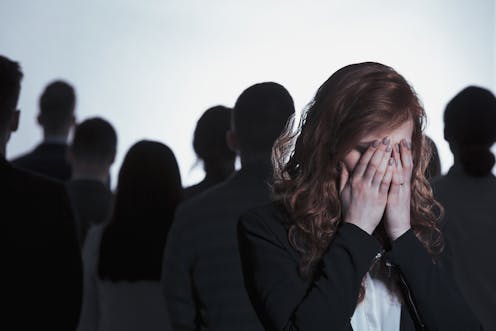The Hanson effect: how hate seeps in and damages us all
- Written by Denis Muller, Senior Research Fellow in the Centre for Advancing Journalism, University of Melbourne

Such hair as I have is cut from time to time by Mrs E, who runs a one-chair salon in my neighbourhood.
She has been in business there for 40 years. She knows all about the history of the street and many of her clients have been coming to her for half a lifetime. The salon is shut on Mondays, when she cuts the hair of the elderly and disabled in various local institutions.
Mrs E is a petite woman with a cloud of brown hair, a bright smile and that empathetic personality that fits so many hairdressers for their parallel occupation of informal counsellor. Under her hairdresser’s smock she wears a dress or a blouse and trousers.
She came to Australia as a child from the Balkans, grew up, married, had two sons. Australia is home and a place where she says she has always felt welcome, until the other day.
A client whose hair she had been cutting for 20 years came in as usual, and then, without any prompting or preamble, launched into a tirade against Muslims.
Mrs E heard her out. As a rule, like most sensible businesspeople, she resists being drawn into conversations about sex, religion or politics.
But eventually it became too much. “I’m a Muslim,” she told the client, “and I very much regret that after 20 years I must tell you I will no longer cut your hair”.
The salon contains no outward sign of her faith: nothing in her appearance or in the room itself gives it away. For her, it is something private; nothing to do with her professional life.
It happened that I came in about a week later. Mrs E and I often talk in general terms about what’s going on in the world. She knows I am a journalist and academic and I think she feels safe pushing her conversational boundaries slightly.
She told me this story and as she did so, the hurt was written all over her face.
And after nearly a lifetime in Australia, she said she felt just that little bit less welcome.
So this is how it goes.
Hate speech becomes part of the currency of national debate and is exploited for political purposes. In 1996, Pauline Hanson delivers her notorious maiden speech in which she says Australia is being “swamped by Asians”. John Howard, as prime minister, dog-whistles that this is all about free speech.
In 2001, the so-called Tampa election occurs. Boat people – overwhelmingly Muslim – become the butt of Howard’s assertion of national sovereignty:
We will decide who comes to this country and the circumstances in which they come.
There are votes in this and both sides of politics pile on. In the midst of the 2013 election, Labor’s Kevin Rudd – the same man who claims Dietrich Bonhoeffer as an inspiration – slams the door on asylum seekers by striking deals with Nauru and Papua New Guinea that Australia is still living with.
In 2014, the federal government tries to weaken the Racial Discrimination Act in what is said to be the interests of free speech. Attorney-General George Brandis asserts that “people have a right to be bigots”.
In 2015, research conducted for the Melbourne Social Equity Institute finds that the single most important driver of negative attitudes toward asylum seekers is religious prejudice, sometimes expressed as concern about the “Islamisation” of Australia.
In August 2017, Hanson wears a burqa into Senate question time. Brandis discovers where bigotry can lead and assails her for an “appalling stunt” disrespectful of the Muslim faith.
Eventually, the political licensing of racism and religious intolerance seeps into the fabric of society. It might take a generation or it might take longer. But when it does it stains and rots that fabric, eating away at people’s sense of belonging, undermining the Australian multicultural project, and in a small suburban hair salon, a middle-aged woman feels emboldened to vent her prejudice, doing harm and hurt to someone who has been tending her person for 20 years.
Authors: Denis Muller, Senior Research Fellow in the Centre for Advancing Journalism, University of Melbourne
Read more http://theconversation.com/the-hanson-effect-how-hate-seeps-in-and-damages-us-all-85314





